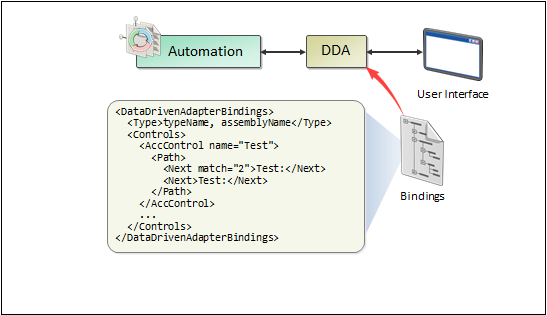Hosted Application Toolkit (HAT) architecture
This topic illustrates the components of Hosted Application Toolkit (HAT) and the application startup process.
HAT components
Data-driven adapters (DDAs): DDAs are generic assemblies that interact with the hosted application's user interface (UI). The UII SDK ships with four types of DDAs:
UIADataDrivenAdapter – This DDA uses the UI Automation framework that shipped with Microsoft .NET Framework 4 to interact with Windows-based applications, Windows Presentation Foundation (WPF), Silverlight, and web applications.
WinDataDrivenAdapter – This DDA uses the Microsoft Active Accessibility (MSAA) framework to interact with Windows-based applications.
WebDataDrivenAdapter – This DDA uses the Document Object Model (DOM) (MSHTML) to interact with web applications.
JavaDataDrivenAdapter – This DDA uses the Java Access Bridge (JDK 1.7 or later) to interact with Java applications.
Bindings: Bindings describe the UI elements with a hosted application and are leveraged by the DDAs.
Automations: Automations are Windows Workflow Foundation (WF) workflows that host the business logic. The Hosted Application Toolkit (HAT) Software Factory provides a set of WF activities to interact with hosted applications. More information: Using HAT automation activities
The following illustration shows the HAT architecture.

Application startup process
The DDA uses bindings and easily identified control names to provide an application’s UI controls to automations. Automations use these names to manage the UI controls. Bindings are provided as part of the initialization string procedure during application startup. The Application Integration Framework extracts these bindings from the initialization string and provides them to the DDA. The following illustration shows the typical process that occurs when an application starts.

See also
UII Application Integration Framework
Work with HAT Software Factory
Use Data Driven Adapters